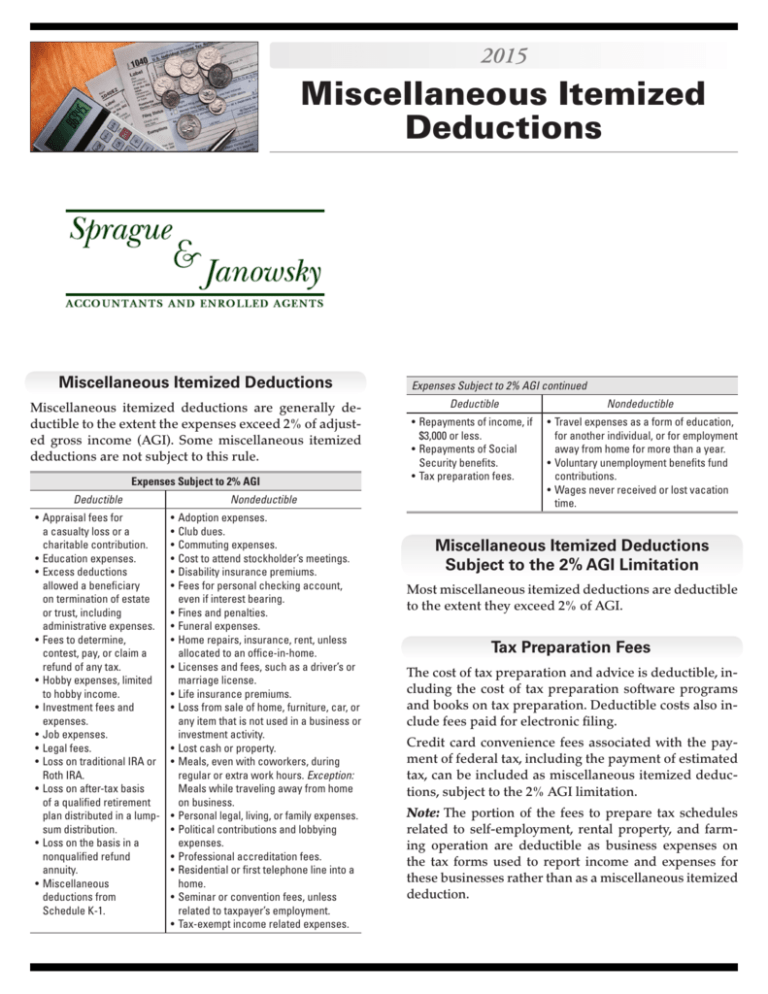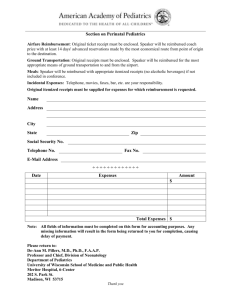
2015
Miscellaneous Itemized
Deductions
Miscellaneous Itemized Deductions
Miscellaneous itemized deductions are generally deductible to the extent the expenses exceed 2% of adjusted gross income (AGI). Some miscellaneous itemized
deductions are not subject to this rule.
Expenses Subject to 2% AGI
Deductible
Nondeductible
• Appraisal fees for
a casualty loss or a
charitable contribution.
• Education expenses.
• Excess deductions
allowed a beneficiary
on termination of estate
or trust, including
administrative expenses.
• Fees to determine,
contest, pay, or claim a
refund of any tax.
• Hobby expenses, limited
to hobby income.
• Investment fees and
expenses.
• Job expenses.
• Legal fees.
• Loss on traditional IRA or
Roth IRA.
• Loss on after-tax basis
of a qualified retirement
plan distributed in a lumpsum distribution.
• Loss on the basis in a
nonqualified refund
annuity.
•Miscellaneous
deductions from
Schedule K-1.
• Adoption expenses.
• Club dues.
• Commuting expenses.
• Cost to attend stockholder’s meetings.
• Disability insurance premiums.
• Fees for personal checking account,
even if interest bearing.
• Fines and penalties.
• Funeral expenses.
• Home repairs, insurance, rent, unless
allocated to an office-in-home.
• Licenses and fees, such as a driver’s or
marriage license.
• Life insurance premiums.
• Loss from sale of home, furniture, car, or
any item that is not used in a business or
investment activity.
• Lost cash or property.
• Meals, even with coworkers, during
regular or extra work hours. Exception:
Meals while traveling away from home
on business.
• Personal legal, living, or family expenses.
• Political contributions and lobbying
expenses.
• Professional accreditation fees.
• Residential or first telephone line into a
home.
• Seminar or convention fees, unless
related to taxpayer’s employment.
• Tax-exempt income related expenses.
Expenses Subject to 2% AGI continued
Deductible
Nondeductible
• Repayments of income, if
$3,000 or less.
• Repayments of Social
Security benefits.
• Tax preparation fees.
• Travel expenses as a form of education,
for another individual, or for employment
away from home for more than a year.
• Voluntary unemployment benefits fund
contributions.
• Wages never received or lost vacation
time.
Miscellaneous Itemized Deductions
Subject to the 2% AGI Limitation
Most miscellaneous itemized deductions are deductible
to the extent they exceed 2% of AGI.
Tax Preparation Fees
The cost of tax preparation and advice is deductible, including the cost of tax preparation software programs
and books on tax preparation. Deductible costs also include fees paid for electronic filing.
Credit card convenience fees associated with the payment of federal tax, including the payment of estimated
tax, can be included as miscellaneous itemized deductions, subject to the 2% AGI limitation.
Note: The portion of the fees to prepare tax schedules
related to self-employment, rental property, and farming operation are deductible as business expenses on
the tax forms used to report income and expenses for
these businesses rather than as a miscellaneous itemized
deduction.
Miscellaneous Deductions Not Subject
to the 2% AGI Limitation
Investment Expenses
Deductible investment expenses, such as separatelybilled IRA trustee fees, are amounts paid to produce,
manage, or protect property held for earning income.
Personal expenses are not deductible.
Loss on Traditional IRA or Roth IRA
Losses on traditional IRAs and Roth IRAs are not deductible unless the entire account balance of all traditional IRAs, or all Roth IRAs, are distributed and the
taxpayer has unrecovered basis left in the traditional or
Roth IRAs. Distribution of the entire account balance
applies separately to all traditional IRAs and Roth IRAs.
Example: Ron owns three separate traditional IRAs and one
Roth IRA. He has a $6,000 basis in his traditional IRAs. His
Roth IRA has a basis of $4,000. Assume one of his traditional
IRAs goes belly up and Ron loses all the money in that account. In order for Ron to claim a loss, he has to have all
funds distributed from his other two IRAs. The Roth IRA does
not have to be distributed. Assume the total account balance
of his other two traditional IRAs equals $7,000. Ron does not
have a deductible loss because total distributions from all traditional IRAs exceed his basis.
The following expenses are not limited by 2% of AGI.
• Casualty and theft losses of income-producing
property.
• Deduction for federal estate tax paid on income in
respect of the decedent.
• Amortizable bond premium on taxable bonds
acquired before October 23, 1986.
• Deduction for repayment of amounts under a claim
of right if over $3,000.
• Deduction for unrecovered investment in a pension
or annuity contract.
Gambling Losses
The full amount of gambling winnings for the year is
reported as income. Gambling losses are deducted as
an itemized deduction up to the total amount reported
as income. Taxpayers claiming losses must keep an accurate diary or similar record of losses and winnings.
Impairment-Related Work Expenses
Taxpayers with physical or mental disabilities who limit
employment or substantially limit one or more major
life activities, such as performing manual tasks, walking,
speaking, breathing, learning, and working, can claim a
deduction for impairment-related work expenses. Expenses must be ordinary and necessary for the employee who is disabled to perform work satisfactorily.
Unrecovered Investment in an Annuity
Legal Expenses
Legal fees related to producing or collecting taxable income or getting tax advice is deductible.
Deductible Legal Expenses
Nondeductible Legal Expenses
• The cost of either doing or
keeping a job, such as expenses
paid to defend against criminal
charges arising from the
taxpayer’s job.
• The cost of tax advice related to
a divorce if the bill specifies how
much is for tax advice and it is
determined in a reasonable way.
• The cost of collecting taxable
alimony.
• Custody of children.
• Breach of promise to marry.
• Civil or criminal charges resulting
from a personal relationship.
• Damages for personal injury.
• Preparation, defense, or
perfection of a title.
• Preparation of a will.
• Property claims or property
settlement in a divorce.
This brochure contains general information for taxpayers and
should not be relied upon as the only source of authority.
Taxpayers should seek professional tax advice for more information.
Copyright © 2014 Tax Materials, Inc.
All Rights Reserved
A retiree who contributed to the cost of an annuity can
exclude from income a part of each payment received
as a tax-free return of the retiree’s investment. If the retiree dies before the entire investment is recovered tax
free, any unrecovered investment can be deducted on
the retiree’s final income tax return.
Contact Us
There are many events that occur during the year that can affect
your tax situation. Preparation of your tax return involves summarizing transactions and events that occurred during the prior
year. In most situations, treatment is firmly established at the
time the transaction occurs. However, negative tax effects can
be avoided by proper planning. Please contact us in advance
if you have questions about the tax effects of a transaction or
event, including the following:
•Retirement.
• Pension or IRA distributions.
• Notice from IRS or other
• Significant change in income or
revenue department.
deductions.
• Divorce or separation.
• Job change.
•Self-employment.
•Marriage.
• Charitable contributions
• Attainment of age 59½ or 70½.
of property in excess of
• Sale or purchase of a business.
$5,000.
• Sale or purchase of a residence
or other real estate.





